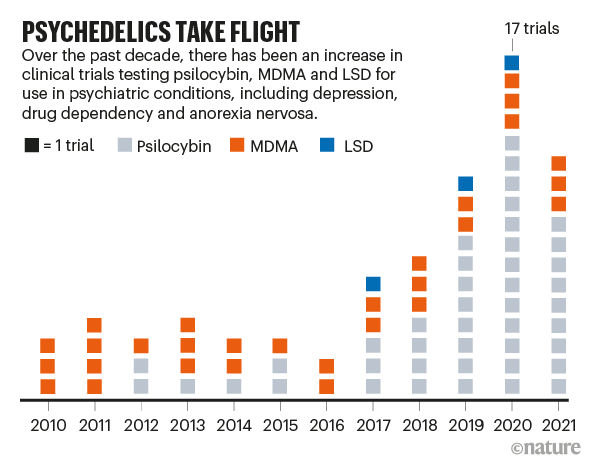Next: Psychedelic-assisted psychotherapy?
 How ecstasy and psilocybin are shaking up psychiatry (Nature):
How ecstasy and psilocybin are shaking up psychiatry (Nature):
… The Imperial study was one of a spate of clinical trials launched over the past few years using illicit psychedelic drugs such as psilocybin, lysergic acid diethylamide (LSD) and MDMA (3,4‑methylenedioxymethamphetamine, also known as molly or ecstasy) to treat mental-health disorders, generally with the close guidance of a psychiatrist or psychotherapist. The idea has been around for decades — or centuries in some cultures — but the momentum has picked up drastically over the past few years as investors and scientists have begun to champion the approach again.
Psychedelic-assisted psychotherapy could provide needed options for debilitating mental-health disorders including PTSD, major depressive disorder, alcohol-use disorder, anorexia nervosa and more that kill thousands every year in the United States, and cost billions worldwide in lost productivity.
But the strategies represent a new frontier for regulators. “This is unexplored ground as far as a formally evaluated intervention for a psychiatric disorder,” says Walter Dunn, a psychiatrist at the University of California, Los Angeles, who sometimes advises the US Food and Drug Administration (FDA) on psychiatric drugs. Most drugs that treat depression and anxiety can be picked up at a neighbourhood pharmacy. These new approaches, by contrast, use a powerful substance in a therapeutic setting under the close watch of a trained psychotherapist, and regulators and treatment providers will need to grapple with how to implement that safely.
Recent study:
Effects of Psilocybin-Assisted Therapy on Major Depressive Disorder (JAMA Psychiatry). Key Points from the study:
- Question: Is psilocybin-assisted therapy efficacious among patients with major depressive disorder?
- Findings: In this randomized clinical trial of 24 participants with major depressive disorder, participants who received immediate psilocybin-assisted therapy compared with delayed treatment showed improvement in blinded clinician rater–assessed depression severity and in self-reported secondary outcomes through the 1‑month follow-up.
- Meaning: This randomized clinical trial found that psilocybin-assisted therapy was efficacious in producing large, rapid, and sustained antidepressant effects in patients with major depressive disorder.
News in Context:
- Study: Psychedelics can promote neural plasticity in the prefrontal cortex and expand pathways for mental health
- How learning changes your brain
- A call to action: We need the right incentives to guide ethical innovation in neurotech and healthcare
- New book by Michael Pollan: How to Change Your Mind: What the New Science of Psychedelics Teaches Us About Consciousness, Dying, Addiction, Depression, and Transcendence
- Classic book by Aldous Huxley: The Doors of Perception and Heaven and Hell


